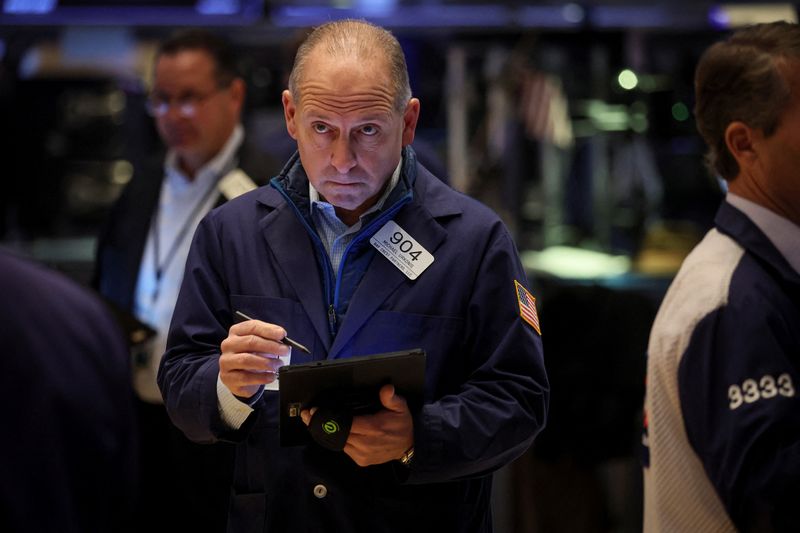U.S. CPI, bank results loom; China deflation fears mount – what’s moving markets
2023.07.10 08:20

© Reuters
Investing.com — Investors gear up for fresh U.S. inflation data that could impact Federal Reserve policy decisions, while quarterly results from big banks are set to unofficially start second-quarter earnings season. Elsewhere, producer prices in China fall at their steepest pace since 2015 and consumer prices stand on the edge of deflation, casting doubt over the health of the economy.
1. U.S. futures lower to begin trading week
Stock futures on Wall Street edged down on Monday as investors looked ahead to the release of U.S. inflation numbers and a slate of earnings from large banks this week (see below).
At 05:02 ET (09:02 GMT), the contract had slipped by 30 points or 0.09%, lost 10 points or 0.24%, and shed 55 points or 0.37%.
The main indices finished the prior trading week in the red following mixed jobs market data, which was widely interpreted as an indication that the Federal Reserve will likely unveil a further interest rate hike as expected at its upcoming policy meeting later this month.
On Friday, the benchmark fell by 0.29%, the broad-based declined by 0.55%, and the decreased by 0.13%.
2. U.S. inflation data and bank earnings highlight weekly agenda
Fresh inflation figures out of the U.S. are set to be the key event of this week’s economic calendar, while results from big U.S. banks will get the ball rolling on second-quarter earnings.
The June from the world’s biggest economy is expected to increase by 3.1% annually, which would be the slowest since March 2021. On a , it is estimated to accelerate slightly to 0.3%. Meanwhile, the core reading, which is closely watched by Federal Reserve policymakers, is seen rising by 5.0% and 0.3% .
As it was with the labor market data last week, these numbers are anticipated to influence the thinking of Fed officials, who have made corralling elevated inflation a central objective of the central bank’s recent year-long campaign of policy tightening.
Elsewhere, Citigroup (NYSE:), JPMorgan Chase (NYSE:), and Wells Fargo (NYSE:) will report their quarterly returns on Friday. Analysts have flagged that the banking giants may be hit by the largest uptick in loan losses since the COVID-19 pandemic.
3. Deflation pressures mount in China
Factory-gate prices in China decreased by the most in more than seven years in June, while consumer prices flirted with deflation, in the latest sign of sluggishness in the world’s second-largest economy.
According to data from the National Bureau of Statistics on Monday, fell by 5.4% annually last month, the sharpest fall since 2015 and steeper than analysts’ estimates of a decrease of 5.0%. Domestic and foreign demand both weakened.
Additionally, the was flat year-on-year due to an accelerating drop in pork prices. The figure, which had been expected to increase by 0.2%, was the slowest since 2021.
The prints bolstered speculation that China’s central bank will continue to slash interest rates and unveil new stimulus measures to help provide fuel to the country’s sputtering post-pandemic recovery.
4. Alibaba shares boosted as China fines Ant Group, soothing regulatory worries
Hong Kong-listed shares in Alibaba Group Holding Ltd (HK:) closed higher on Monday, driven by hopes that a Chinese fine of its Ant Group fintech arm will bring an end to years of regulatory scrutiny.
On Friday, Chinese officials handed down a penalty worth $984 million to Ant, which was spun off by Alibaba (NYSE:) more than a decade ago. The e-commerce behemoth retains a 33% interest in the business.
In the wake of the announcement, Ant said it would embark on an up to $6 billion share repurchase program at a valuation of $78.5 billion — around 70% below the level touted by the company in a now-shelved initial public offering.
Ant ditched its IPO in 2020, marking the beginning of a corporate crackdown by Beijing that led to uncertainty over the rules governing some of the country’s largest businesses.
5. Oil drops on Chinese demand concerns
Oil prices slipped on Monday as the weak Chinese inflation data sparked fresh worries over the nascent economic recovery of the world’s largest crude importer.
By 05:03 ET, futures traded 0.9% lower at $73.21 a barrel, while the contract fell 0.84% to $77.81 per barrel.
Both benchmarks had gained more than 4% last week — touching their highest levels since May — thanks in large part to the world’s biggest oil exporters Saudi Arabia and Russia announcing plans to deepen supply cuts in August.
These expected reductions helped to limit losses stemming from the Chinese data, according to analysts cited by Reuters.








